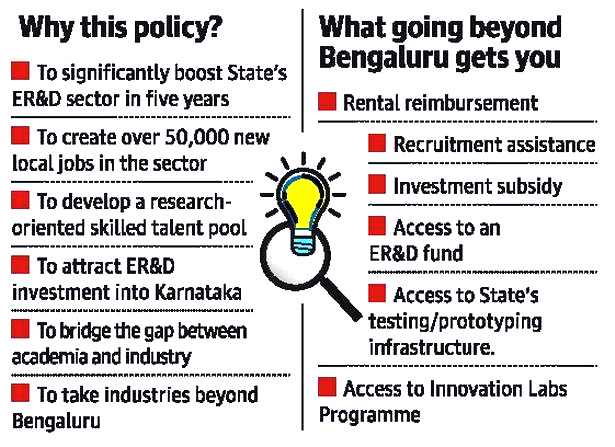Governance
Karnataka’s Engineering Research & Development Policy
- 03 Mar 2021
- 4 min read
Why in News
Recently, Karnataka launched the country’s maiden Engineering Research & Development (ER&D) Policy.
Key Points
- About:
- Key Sectors:
- The new policy identified five key focus sectors such as aerospace and defence; auto, auto components and EV; biotechnology, pharma and medical devices; semiconductors, telecom, and software products.
- Skilling:
- The government will invest in skilling, improve academia and industry collaboration, and also encourage intellectual properties (IPs) creation locally.
- Subsidies:
- It will offer up to 50% reimbursement of rentals up to Rs 2 crore to Multi-National Corporation (MNC) entities beyond Bengaluru Urban district.
- It will also offer recruitment assistance and up to 20% subsidy up to Rs. 2 crore for investing in the State beyond Bengaluru.
- These subsidies will be assessed on case to case basis based on the investment the companies are making and also employment they generate.
- Innovation:
- To promote innovation, the government will provide funding to colleges for projects and will also fund the cost of developing industry-oriented courses in the colleges and universities. This is so that talents are in line with the industry demand.
- Key Sectors:
- Aim:
- To prepare the State to make use of the future opportunities emanating from this sector.
- To grow Karnataka’s contribution, develop more IPs, and make Karnataka a skilled knowledge capital.
- To attract MNCs to establish new ER&D centres in the State or expand their existing facilities through subsidies, market the advantages of the ecosystem to global MNCs and bridging the gap between engineering talent and opportunity.
- Need:
- The ER&D sector in the country is the fastest growing industry with a Compound Annual Growth Rate (CAGR) of 12.8%.
- CAGR is the rate of return that would be required for an investment to grow from its beginning balance to its ending balance, assuming the profits were reinvested at the end of each year of the investment's lifespan.
- The global engineering research and development industry is expected to reach a spend of USD 2 trillion by 2025.
- There are about 900 global capability centres for ER&D in India and a significant share of them in Karnataka.
- The State government anticipates the policy has the potential to create over 50,000 jobs in the ER&D space in five years.
- According to industry apex body Nasscom, ER&D has the potential to become a USD 100-billion industry in the country in the next five years.
- Linkage between Digital Engineering and Industry 4.0, which reflects in the form of:
- Digitalized manufacturing operations & automation in processes and supply chains;
- Product-as-a-Service Business Model, allowing customers to pay for a desired result (instead of the equipment driving the result);
- Additive Manufacturing, which can deconstruct the tedious production processes engaged for complex parts and enhance their functional performance.
- The ER&D sector in the country is the fastest growing industry with a Compound Annual Growth Rate (CAGR) of 12.8%.







